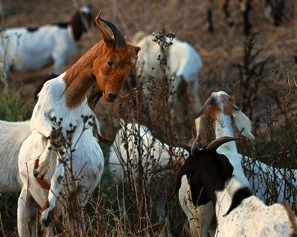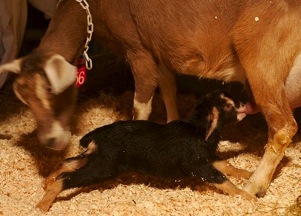Life History and Reproduction

“Not Quite the Story of the Stork”
Capra hircus reproduces by sexual reproduction. Individuals typically have either male or female gonads, but not both. However, in the case of intersexual organisms, individuals can be a true hermaphrodite and have both types of gonads, or be a psuedohermaphrodite and possess one type of gonads but exhibit behaviors of the other sex during puberty. Though intersexuality is a rarity, it is more common in goats than in any other domestic animal.
Goats are placental animals and undergo internal fertilization. For domestic goats, breeding is usually controlled by humans and can proceed through either direct or artificial insemination. Breeding is classified as polygynous. One male, usually with desired traits or health, is chosen to breed with several females. Males can mate between 10 and 20 times per day.
In the wild, the breeding situation is
similar. Males compete for rank within
a herd by butting heads and only the
highest-ranking males mate with the
females. The dominant males exhibit a
behavior known as tending in which
they stay close to their female mating
partner while she is in estrus. Once they
are done mating, the male moves onto
the next female. In some cases, the
lower ranking males (usually the less
matured males) gain the opportunity
to breed. They do this by coursing, or
separating the female from her tending male.
Goat breeding season occurs during the fall and winter and is triggered by the decreasing amount of daylight as the day shortens. During these seasons the female, or doe, undergoes an estrus cycle that lasts for 18 days. Throughout this cycle she will frequently “flag” or raise her tail and will tolerate being mounted by other goats. During the fall and winter seasons, the male goat, or buck, produces more testosterone and its sebaceous gland produces a secretion that gives off a distinct rank odor.
Once a male fertilizes a female, the
gestation period lasts between 146 to
152 days. Typically, a female will
have between one between three
offspring at a time, but twinning is
very common. Young goats, or kids,
can walk within hours of birth. Their
mother cares them for until about 10
months of age, at which time they are
weaned and can graze independently.
In some circumstances goats can be
reared artificially and weaned after only 6 or fewer weeks. This process allows female goats to be able to breed sooner after giving birth because they do not have to care for their young. Young males are capable of reproducing at 4-5 months of age and females mature within a year.
For more information on artificial goat rearing, click here.
To return home, click here.
To learn about the goat’s interactions with other species, click here.
Male goats preparing to headbutt.
Photo by (nz)dave
Baby goat nursing from its mother.
Photo by ransford


